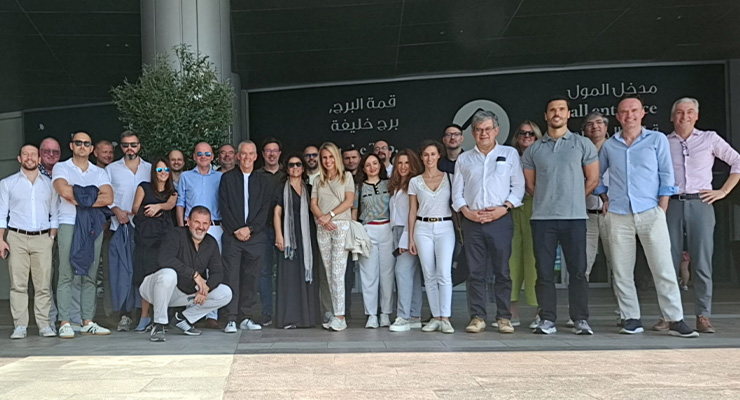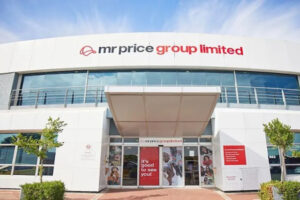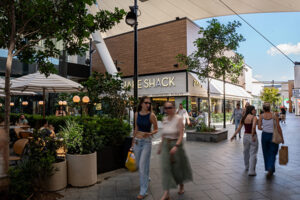Written by
Peter Sempelmann
Dubai may dazzle with its fountains, super-towers, and endless malls, but beneath the spectacle lies a finely tuned, hyper-competitive business ecosystem. At the ACROSS Study Tour John Hadden, CEO of Alshaya Group, one of the most influential retail operators in the Middle East, and F&B expert and long-time Dubai resident Will Odwarka lifted the lid on how business really works in that safe, fast-moving, franchise-driven, and relentlessly pro-business city.
A Market Built on Safety and Sky-High Footfall
For Odwarka, the foundation of Dubai’s business success begins with something surprisingly simple: stability.
“It’s one of the safest places on the planet,” he says. “You don’t need to worry about anything.” That stability, he argues, is precisely what makes the city such a powerful magnet for families, talent, and investors.
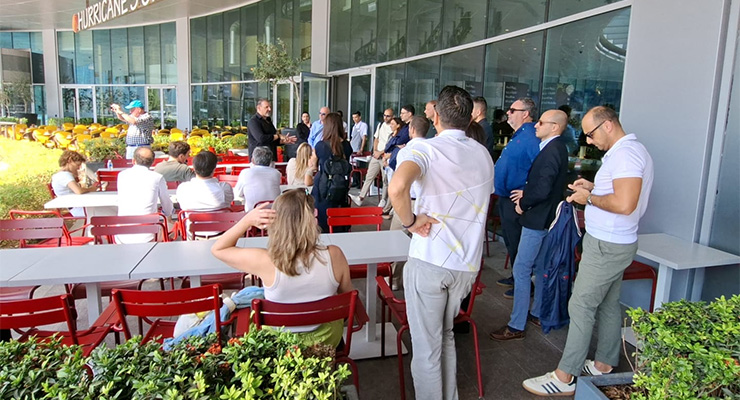
But he’s quick to underline that business operates within a culturally conservative context. “You’re in a traditional Arab country. Respect matters,” he advises – whether that’s you better not photograph people or how you voice criticism.
This mix of security + cultural respect + openness creates the environment in which Dubai’s retail sector thrives – most visibly at Dubai Mall, which Odwarka calls “almost a city” by itself. Dubai Mall, the glamorous prestige-shopping place in downtown Dubai, attracts 80–100 million annual visits and functions as a hybrid of shopping, dining, and entertainment.
Franchise Powerhouse: How Retail Works at the Gulf
Hadden explains the machine behind this landscape. As CEO of Alshaya Group, he oversees 4,000 stores across 18 countries, operating brands from Starbucks and H&M to Shake Shack, Primark, and Victoria’s Secret.
“This is a franchise-driven retail world”, he says. “95% of the market is franchises.”
Why? Because operating requires local partners who can navigate permits, trade licenses, and regulations. Although Dubai is slowly shifting and Apple is among the first brands to run a store directly, the franchise model still dominates along the Persian Gulf.
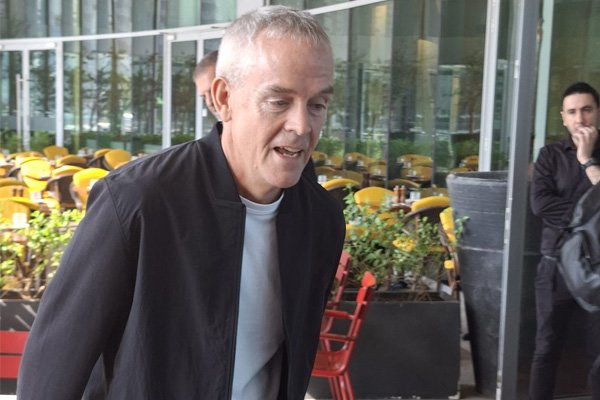
And franchise is not just widespread, it’s concentrated. “Malls here are filled by 8 to 10 big family groups,” Hadden says. It’s the opposite of fragmented European high streets. In the United Arabian Emirates all operators often pre-lease 70–75% of the available space to major players long before smaller tenants enter the conversation.
The Customer: Young, Digital, Global
Dubai’s resident population is just 4.5 million, but the city welcomes 20 million tourists a year—a fact that shapes everything.
“Our customer profiling here is 75–80% tourists,” Hadden notes. That’s why Dubai Mall stores often hit global #1 rankings in sales for major brands.
At the same time, the regional demographic skews young (“70% under 35”), hyper-digital, and highly informed. This also applies for prices. Dubai is not a cheap place to shop. “We used to charge a premium over Europe,” Hadden says. “But that’s disappearing. The consumer is too savvy now.”
Of course also because of fast-fashion online disruptors like Shein and Temu wo have intensified the pricing pressure and set new benchmarks for speed and value.
Why Dubai Keeps Growing and Attracting Businesses
But nevertheless, Dubai keeps on building and growing with seemingly only the sky as a limit. New skyscrapers are built almost daily and the number of incoming tourists keeps on rising.
Both industry experts highlight Dubai’s pro-business governance as the engine behind its momentum. Hadden puts it plainly: “With one leader and a very pro-business approach, things just get done here.”
Tourism remains the emirate’s economic flywheel, and its role is expanding as airport capacity grows and geopolitical instability elsewhere pushes global talent toward Dubai’s safety and neutrality. Golden visas, foreign property ownership zones, and flood-like inward migration have created a real estate boom that feeds retail, hospitality, and construction.
Odwarka emphasizes that Dubai’s growth and economy in general is not built on oil: “Real estate, tourism, trade, and finance—those are the pillars.”
Where the Opportunities Are
According to Hadden, the next decade will be shaped by:
- F&B growth: “There’s still huge opportunity. Dwell time here is massive.”
- Beauty: “One of the region’s strongest-performing categories.”
- Entertainment: “Still poor quality. A big white space for innovation.”
- Value retail: “Primark is entering the market for a reason.”
- Luxury expansion: “Both Dubai Mall and Mall of the Emirates are extending luxury precincts.”
Apparel, on the other hand, is a much tougher business. “Competition is rife,” he says, especially from digital-first challengers.
Takeaway: Agility and Ambition are Rewarded
Business in Dubai is fast, competitive, and relationship-driven. Scale matters. Local partners matter. Cultural respect matters. But ambition pays off.
“It’s a place that will keep growing as long as it stays safe and pro-business,” Hadden concludes. “And for companies who get the model right, the payoff can be extraordinary – sometimes even world-leading.”
As Odwarka puts it: “In Dubai, you have everything known to man in the retail environment.”
For the global retail industry, that’s not just a statement but an invitation.

